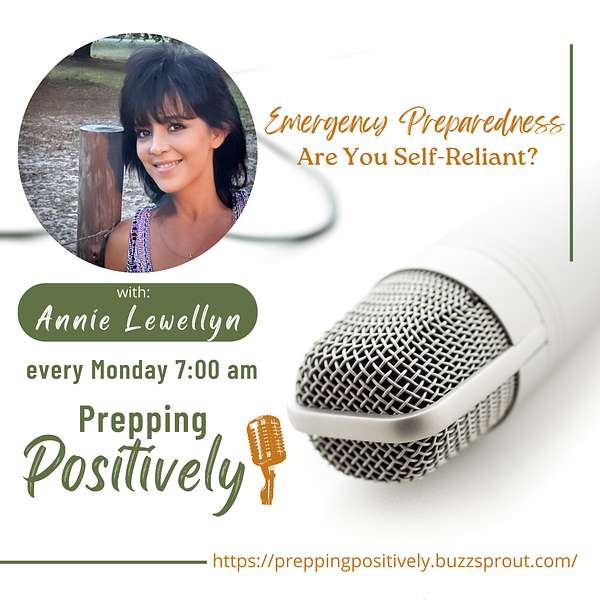
Prepping Positively
Prepping skills taught on a positive note. From growing your own food and stocking a prepper pantry, to providing your own water and electricity and making your own natural remedies, learn the prepping skills you need to sustain you and your family through any crisis.
Prepping Positively
Emergency Preparedness: Are You Self-Reliant?
Are you self-reliant when it comes to emergency preparedness? In today's episode, we'll explore the key elements that define self-reliance during challenging times.
Season 2 Episode 29
Emergency Preparedness: Are You Self-Reliant?
Welcome to “Prepping Positively," the podcast series that will empower you with the knowledge and skills you need to lead a more self-reliant and fulfilling life. In a world filled with uncertainty and rapid change, the art of self-reliance has never been more important. This series of episodes will delve deep into various aspects of self-reliance, exploring everything from homesteading and sustainable living to emergency preparedness, personal finance, and so much more.
Each episode will feature practical tips to help you become more self-sufficient in a modern world. Whether you're a seasoned homesteader, a beginner prepper, or simply curious about embracing self-reliance, “Prepping Positively" is your go-to resource for guidance and inspiration. So, if you're ready to take control of your own destiny and gain the skills to thrive in any situation, join me on this exciting journey towards self-reliance. Your adventure begins here.
Are you self-reliant when it comes to emergency preparedness? In today's episode, we'll explore the key elements that define self-reliance during challenging times.
Hello, my fantastic listeners, and welcome back to "Prepping Positively." I'm Annie, your host, and today we're delving deep into the topic of emergency preparedness. Specifically, we'll be discussing what it means to be self-reliant during a crisis and why it's a crucial aspect of prepping. So, let's jump right in!
To be self-reliant during emergencies means that you have the skills, resources, and mindset to take care of yourself and your loved ones when traditional systems and support networks may not be available.
Self-reliance involves:
- Sustainable Supplies: Having a well-stocked supply of food, water, and essential supplies that can sustain you and your family for an extended period.
- Survival Skills: Developing basic survival skills like first aid, navigation, and fire-making, which can be crucial during disasters.
- Energy Independence: Generating your own power through renewable sources, such as solar or wind, to maintain essential systems like lighting and communication.
- One of the most critical aspects of self-reliance during an emergency is ensuring you have a safe shelter and the means to protect yourself.
Here's what you need to consider:
- Home Safety: Reinforce your home with measures like storm shutters, secure locks, and a safe room if you live in an area prone to natural disasters.
- Firearms and Self-Defense: Learn how to use firearms responsibly for personal and home defense, if it's legal and aligns with your values.
- Communication: Invest in reliable communication devices such as two-way radios, satellite phones, or HAM radios to stay connected when other means fail.
Access to food and clean water is essential for self-reliance.
Here's how to ensure you have a sustainable supply:
- Food Storage: Stockpile non-perishable foods, canned goods, and MREs (Meals Ready to Eat) that have a long shelf life.
- Water Storage: Store ample water in containers that are designed for long-term water storage. Consider rainwater harvesting and purification systems.
- Gardening Skills: Learn to grow your food in case the emergency situation extends for a more extended period. Gardening can provide fresh produce.
Health is paramount, especially during emergencies.
Here's what you can do to ensure self-reliance in healthcare:
- First Aid Training: Acquire first aid skills and knowledge. Consider taking courses to become proficient in dealing with injuries and illnesses.
- Medical Supplies: Stock up on essential medical supplies, including prescription medications, bandages, and over-the-counter drugs.
- Alternative Medicine: Explore alternative healthcare options and herbal remedies that can be used when traditional medical resources are unavailable.
Being self-reliant during emergencies also requires the right mindset. It's about building resilience and staying positive.
Here's how you can achieve this:
- Mental Preparedness: Prepare yourself mentally by visualizing potential emergency scenarios and developing coping strategies.
- Stress Management: Learn stress management techniques to stay calm under pressure and make clear decisions.
- Community Engagement: Connect with like-minded preppers and form a support network in your community.
Being self-reliant is an ongoing journey.
Here are some tips to keep improving your emergency preparedness:
- Regular Drills: Conduct regular emergency drills to test your plans and identify areas for improvement.
- Update Supplies: Regularly check and rotate your supplies to ensure they remain fresh and functional.
- Stay Informed: Keep up-to-date with the latest developments in emergency preparedness and make adjustments as necessary.
Thank you for joining me today on "Prepping Positively." Remember that self-reliance during emergencies is about taking control of your life and ensuring the safety and well-being of your loved ones.
Feel free to reach out with your questions or share your self-reliance experiences with us on social media. Don't forget to subscribe for future episodes, and, as always, stay positive, stay prepared, and be self-reliant in the face of any challenge.